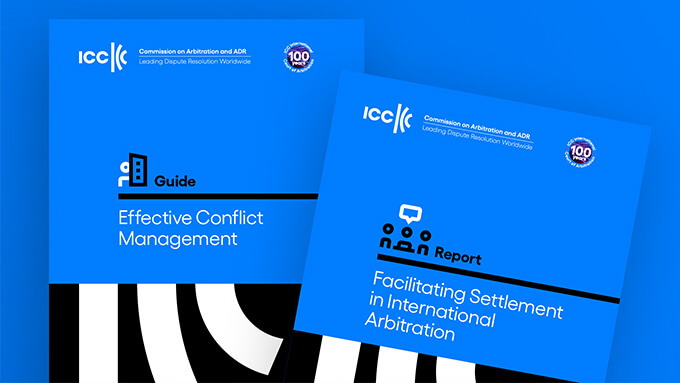Complex Arbitrations: An Overall View of the ICC Rules - III
Introduction
This article is the third and last of a series of articles on the ICC Rules that regulates complex arbitrations. In the first article, the structure of the ICC Rules on complex arbitrations[1] and, in the second one, Article 7 regulating the joinder of additional parties, and Article 10 regulating consolidation of arbitrations, were examined[2]. In this article, Article 8 and Article 9 that regulate claims between multiple parties and arbitrations with multiple contracts, respectively, will be examined.
As stated in the first article, the ICC Rules’ provisions on complex arbitrations make clear reference to Article 6 of the ICC Rules that regulate the effect of arbitration agreements. Particularly, Article 6(4)(i) relates to multi-party arbitrations; whereas, Article 6(4)(ii) sets forth the requirements for multi-contract arbitrations if there are multiple arbitration agreements. For this reason, when the rules of complex arbitrations on multi-contract and multi-party arbitrations are examined, Article 6(4) and its subparagraphs (i) and (ii), should always be taken into consideration, as well.
Claims between Multiple Parties – ICC Rules Article 8
First of all, Article 8 applies if there is a multi-party arbitration. This means that either as respondent or as claimant, or as an additional party, there must be more than two parties involved in the arbitration. If there is only one claimant and only one respondent, Article 8 shall not apply.
There are three subparagraphs in Article 8 of the ICC Rules. The first paragraph sets forth general rules regarding claims between multiple parties. The second paragraph defines the content of the claims, and the third paragraph is related to the procedure for making the claim and answering it.
As seen in the title of Article 8, as well as in Article 8(1), this Article regulates the claims between multiple parties. As per Article 2 of the ICC Rules, “claim” or “claims” include any claim by any party against any other party. Considering the use of “may” in the Article, it is understood that raising claims is not an obligation for the parties, but rather an authority to do so. It should also be stated that Article 8 does not seek to make counterclaims between the parties. Any party may make any claim against any party irrespective of whether that party has made a claim against it. One or more claimants, defendants, and additional parties may make claims against each other. However, the party against which a claim is addressed must already be a party to the arbitration; otherwise, the claiming party must refer to Article 7 of the ICC rules and join the additional party to the arbitration by filing its claim against that party.
Although the Article entitles the parties to make claims against each other, there is a time limit in which to do so. According to Article 8(1), no new claims may be made after the terms of reference are signed by the parties and the arbitral tribunal, or approved by the Court. As is pointed out, the time to make claims is not limited to the constitution of the arbitral tribunal (unlike Article 7 on the joinder of parties), but to the finalization of the terms of reference. If any party files a claim after the terms of reference is finalized, such claim will be subject to authorization by the arbitral tribunal, and the latter shall rule taking into consideration Article 23(4) of the ICC Rules.
When making a claim between multiple parties, Article 8(3) that clarifies how the claims will be made according to the different stages of the proceedings should also be taken into consideration. According to this sub-paragraph, if the claims are made prior to the Secretariat transmitting the file to the arbitral tribunal, the provisions related to request for arbitration, and answer to the request for arbitration, shall apply mutatis mutandis. If the claims are to be made after the Secretariat transmits the file to the arbitral tribunal, then the latter shall determine the procedure. There is no restriction or guideline as to how the arbitral tribunal shall make such determination.
Article 8(1) makes reference to the provisions of Articles 6(3)-6(7) and Article 9. As per these references, it should be kept in mind that all parties against which a claim will be made must be a party with respect to which the Court is prima facie satisfied that an arbitration agreement under the Rules binds it. Thus, if a claim is made by one of the parties against any of the parties, the Court shall decide whether such claim may be made against that party as per the relevant arbitration agreement. If the claims are based on a different arbitration agreement, then Article 9 shall apply.
Multiple Contracts – ICC Rules Article 9
Article 9 of the ICC Rules regulates arbitrations with multiple contracts. This Article makes clear that claims under different contracts and different arbitration agreements may be brought in the same arbitration. There is no restriction of any number for party, contract and arbitration agreement. It should not be thought that the claims in a multi-contract arbitration must be made by the same party. For instance, the respondent may make a claim under a different contract or different arbitration agreement. What is important here is that the parties must specify which claim is made under which arbitration agreement (ICC Rules Article 4(3)(e-f)).
At this point, it should be repeated that this provision of Article 9 starts with the references to Articles 6(3)-6(7) and Article 23(4). These references mean that the claims must be made until the terms of reference are established and the jurisdiction is upheld by the Court as a consequence of its prima facie assessment. The second important result of these references is the application of Article 6(4)(ii), which will be elaborated upon, below.
Article 9 clearly specifies that for a multi-contract arbitration, the claims do not need to be made under the same arbitration agreement. The claims may be made either under one, or more than one, arbitration agreement.
It is also important to note that “multiple contracts” and “multiple arbitration agreements” are separate issues and have different legal effects. More specifically, Article 6(4)(ii) applies only in multi-contract cases where there are multiple arbitration agreements. If there are multiple contracts, but only one arbitration agreement, only Article 9 will apply, and the requirements set forth under Article 6(4)(ii) will not be sought; this sub-paragraph does not apply to multiple contracts with only one arbitration agreement.
Accordingly, if the claims are made under more than one contract, but with one arbitration agreement, only Article 9 shall apply, and the prima facie assessment will be made according to Article 6(3) together with the first sentence of Article 6(4); no examination as to Article 6(4)(ii) will be made. However, if more than one arbitration agreement is at stake, then Article 6(4)(ii) shall also apply.
Article 6(4)(ii) stipulates two conditions for making claims under more than one arbitration agreement. Firstly, the arbitration agreements must be compatible; and secondly, it must be established by the Court that all parties to the arbitrations may have agreed that those claims can be decided together under a single arbitration. For making such evaluation, no guidance is provided. There is no definition or explanation under the ICC Rules provided for “more than one arbitration agreement,” “compatibility,” and the constructive consent of the parties who “may have agreed” to a single arbitration[3].
The Court has discretion to decide on these matters. It is generally accepted that the compatibility test, which is also made for consolidation of arbitrations as per Article 10 of the ICC Rules, refers mostly to procedural aspects of the arbitration agreements, such as the place of arbitration, the number of arbitrators, and the language, etc. The law applicable to the merits is not seen as an incompatible matter, as the arbitral tribunals may decide on the claims according to different substantive laws.
Although the arbitration agreements do not need to be identical, it is important that the arbitration agreements do not contradict. On the other hand, it is not clear how to decide if the arbitration agreements do not contradict, but one of them is silent in some matters, which matters are regulated under other one. Having said that, it should not be forgotten that the parties are always free to rectify any incompatibilities of arbitration agreements, if any.
Another challenging requirement in Article 6(4)(ii) is to determine whether all parties to the arbitration may have agreed that those claims can be determined together in a single arbitration. The Article requires establishing that the parties may have agreed, and not have agreed. This is constructive consent. The determination is at the discretion of the Court, and it may take into consideration all elements that might lead to such conclusion. For instance, it is asserted that identical arbitration agreements would be a sign for constructive consent, and different arbitration agreements may lead to the opposite. The Court may take into consideration the identity of the parties to different arbitration agreements and their relation, dates of the contracts containing the arbitration agreements, and similarities in the wording of the arbitration agreements. The Court may also take into consideration whether the contracts containing the arbitration agreements relate to the same legal relationship and/or the same economic transaction (as provided for consolidation of arbitrations as per Article 10 of the ICC Rules), whether the relationship between the contracts are horizontal or vertical, etc.
As is seen above, Article 9 appears to be a simple Article with one phrase only, but with the references to Article 6(4)(ii), the evaluation may become more complicated.
In a Nutshell
In light of the foregoing, it might be helpful to summarize the application of Article 6(4) of the ICC Rules in the case of multi-contract and multi-party arbitrations:
- If there are two parties, and the claims are based on one arbitration agreement only, the first sentence of Article 6(4) applies.
- If there are more than two parties, and the claims are based on only one arbitration agreement, the requirements of Article 6(4)(i) also apply.
- If there are two parties, and the claims are based on two or more arbitration agreements, the requirements of Article 6(4)(ii) also apply.
- If there are more than two parties, and the claims are based on two or more arbitration agreements, the specific requirements under both Article 6(4)(i) and Article 6(4)(ii) apply.
As a final note: The Court does not apply the requirements, separately; rather, it makes an holistic assessment of the case.
Conclusion
In the third and last of this article series on complex arbitrations, the provisions of Article 8 and Article 9 that regulate claims between multiple parties and arbitrations with multiple contracts, respectively, and their relations with Article 6(4)(i) and 6(4)(ii), are examined.
As has been set forth in this article series, complex arbitrations are one of the most complicated issues in the arena of international arbitration. The need to resolve complex disputes that arise out of commercial transactions with multiple contracts and multiple parties, on the one hand, and the consensual nature of arbitration agreements, on the other hand, raise several procedural and jurisdictional problems. However, the ICC Rules has specific regulations as to these matters that have been adopted as a consequence of long-lasting experiences.
In any event, particularly if the parties will be involved in complex transactions, it might be vital for their success in arbitration to consider the provisions on complex arbitrations, not only at the dispute stage, but also at the negotiation stages of the contracts and the arbitration agreements.
[1] Fatih Isik: Complex Arbitrations: An Overall View of the ICC Rules – I, Erdem & Erdem March 2019 Newsletter.
[2] Fatih Isik: Complex Arbitrations: An Overall View of the ICC Rules – II, Erdem & Erdem June 2019 Newsletter.
[3] However, “The Secretariat"s Guide to ICC Arbitration” by Jason Fry, Simon Greenberg and Francesca Mazza (ICC Publication No. 729E, 2012 Edition) provides important insight on how the Court conducts its evaluations.
All rights of this article are reserved. This article may not be used, reproduced, copied, published, distributed, or otherwise disseminated without quotation or Erdem & Erdem Law Firm's written consent. Any content created without citing the resource or Erdem & Erdem Law Firm’s written consent is regularly tracked, and legal action will be taken in case of violation.
Other Contents

Emergency arbitration addresses the need for interim protection before the arbitral tribunal is constituted in institutional arbitrations. Arbitral institutions establish short timeframes to ensure parties can obtain interim relief quickly. For example, the International Chamber of Commerce (“ICC”) requires that the emergency...

International arbitration remains the preferred mechanism for resolving complex cross-border disputes. Yet despite its advantages—neutrality, enforceability, flexibility—arbitration is frequently criticized for being too slow, too expensive, and too procedurally heavy. Often, parties proceed through hearings and...

For arbitral awards rendered in international commercial arbitration to produce legal effects in foreign jurisdictions, they must be subjected to proceedings for “recognition” and “enforcement.” This process is governed by the New York Convention as well as by the provisions of the Law on Private International Law...

Arbitrability, the determination of whether a specific subject matter can be resolved through arbitration, constitutes a fundamental aspect of arbitration within the scope of international commercial dispute resolution. This concept draws a delicate balance between party autonomy—a fundamental principle of arbitration...

The recognition, enforcement, and annulment of foreign court and arbitral awards in Türkiye are processes in which public policy emerges as one of the most critical criteria for review, both in theory and in practice. The Court of Cassation decisions determine the direction of case law regarding the scope and...

As is well known, the action for annulment of objection is a special type of lawsuit regulated under Article 67 of the Turkish Execution and Bankruptcy Law No. 2004 (“EBL”). The primary objective of this action is to nullify a debtor’s objection to execution proceedings. Despite its procedural function of facilitating...

On 16 December 2024, the London Court of International Arbitration (“LCIA”) released its third batch of challenge decisions covering the period from 22 July 2017 to 31 December 2022. The LCIA has also issued a detailed commentary that identifies key legal themes and analytical trends, offering practitioners...

The International Chamber of Commerce (“ICC”) has published its report on the dispute resolution statistics for 2023 (“Report”) , shedding light on the evolving landscape of international arbitration...

Syndicated loans undoubtedly hold a significant position among global financing models. In 2023 alone, 3,655 syndicated loans were provided to companies in the US, with their total value reaching USD 2.4 trillion...

Preliminary attachment refers to the temporary seizure of a debtor's assets to secure a creditor's claim. While it serves as a vital instrument for safeguarding the rights of creditors, it is subject to specific and stringent conditions under Turkish law to prevent any potential misuse...

One of the most important reasons for parties to choose arbitration is the opportunity to freely choose their arbitrators. This freedom granted to the parties also distinguishes arbitration from proceedings before state courts, where the parties are deprived of the power to determine the judges who will conduct the...

The 6th Civil Chamber of the Court of Cassation ruled on October 12, 2022, that national courts have jurisdiction over objections to provisional measures in international arbitration disputes...

The declaration of intent to resolve disputes through arbitration is the fundamental constituent element of an arbitration agreement. To speak of a valid arbitration agreement, the parties' intention to arbitrate must emerge in a way that leaves no room for dispute...

In the wake of the evolving dynamics of commercial transactions, the Netherlands Arbitration Institute Foundation (NAI) announced new arbitration rules . 2024 NAI Arbitration Rules are in force as of 1 March 2024 and will be applicable on proceedings filed on or after this date...

With the global shift to online activities, domain names play a crucial role in identifying businesses. It is more common than ever for a domain name to be registered that is confusingly similar to a trademark or service mark...

The ICC Commission on Arbitration and ADR (“Commission”) published a new guide and report with the aim to increase awareness on alternative dispute resolution (“ADR”) mechanisms to prevent disputes and strengthen the relationship between all stakeholders.The Guide on Effective Conflict Management...

Mergers and Acquisitions (“M&A”) are restructuring of companies or assets through various types of financial transactions, such as mergers, acquisitions, purchase of assets, or management acquisitions. This Newsletter article covers M&A disputes being solved before arbitral tribunals.

In the context of arbitration practice, the principle of revision au fond means that the courts can not examine the merits of a dispute when reviewing an arbitral award. This principle is most commonly encountered in set aside and enforcement proceedings. An arbitral award is evidence of the parties’ willingness...

Under Turkish law, parties may agree on the settlement of disputes that have arisen or may arise, regarding the rights that they can freely dispose of, by arbitration. However, disputes which are not subject to the will of parties, such as the disputes relating to in rem rights of immovables, bankruptcy law...

On 4 September 2020, a research project “Does a Right to a Physical Hearing Exist in International Arbitration?” was launched by an International Council for Commercial Arbitration (“ICCA”) taskforce. Due to the Covid-19 pandemic, many arbitration hearings were held online. Many institutional rules...

Dubai International Arbitration Center amended its Arbitration Rules on 25 February 2022. The 2022 Arbitration Rules were published on 2 March 2022 and came into effect on 21 March 2022. The Rules will be applied to arbitrations that are filed after 21 March 2022; unless parties agree otherwise...

In the aftermath of the Achmea decision, controversies on intra-EU arbitrations continue. Most recently, the Paris Court of Appeal has annulled two arbitral awards rendered against Poland. Meanwhile, the Higher Regional Court of Berlin has refused to declare that an Irish investor’s ICSID claim...


Under Turkish law, the legal remedy that can be applied against arbitral awards is an annulment action. Law on International Arbitration No. 4686 (“IAL”) finds its application area in arbitration proceedings where Turkey is the place of arbitration...

It is well known that following a decision of the Court of Justice of the European Union, problems arose related to arbitration of intra-EU disputes, and particularly arbitration under the Energy Charter Treaty...

Arbitration in corporate law contains controversial elements in many respects, especially the issue of arbitrability. Even in legal systems where these disputes are considered to be arbitrable, uncertainties remain on whether an arbitration clause can be included in the articles of...





Arbitration has benifited from a great increase in the use of technology which has directly effected the conduct of proceedings. More particularly, with digitalization, the way that we conduct arbitration proceedings has been changed to reflect the current needs of parties, with an aim of increasing time...
































































